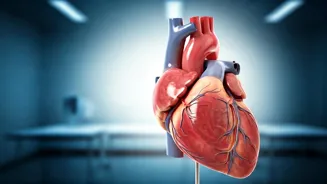Dietary Adjustments
The foundation of heart health begins with what you eat. Cardiologists emphasize the importance of adopting a heart-healthy diet. This includes limiting
the intake of saturated and trans fats often found in processed foods, red meat, and fried items. Instead, they suggest increasing consumption of fruits, vegetables, whole grains, and lean proteins like fish and poultry. Including foods rich in omega-3 fatty acids, such as salmon and flaxseed, can also be beneficial. Reducing salt intake is another crucial dietary adjustment, as high sodium levels can lead to increased blood pressure, putting strain on the heart. Reading food labels carefully to monitor sodium content is a simple, yet effective step. Furthermore, portion control is emphasized. Eating smaller, balanced meals throughout the day can prevent overeating and help maintain a healthy weight, directly benefiting cardiovascular health.
Regular Exercise
Physical activity is another critical component of heart health. Cardiologists recommend at least 150 minutes of moderate-intensity aerobic exercise or 75 minutes of vigorous-intensity exercise each week. Moderate activities include brisk walking, cycling, or swimming, while vigorous activities involve running or high-intensity interval training. These activities help improve cardiovascular function, lower cholesterol levels, and control blood pressure. Besides aerobic exercises, incorporating strength training exercises, such as lifting weights or using resistance bands, is also beneficial. Strength training can help build muscle mass, which boosts metabolism and aids in weight management. It's important to choose activities you enjoy to ensure adherence. Even breaking up sedentary periods with short bursts of movement can make a difference. Simple steps like taking the stairs instead of the elevator or walking during your lunch break contribute positively to overall cardiovascular health.
Health Monitoring
Regular health check-ups and screenings are essential for early detection and management of heart-related conditions. Cardiologists advise routine visits to monitor blood pressure, cholesterol levels, and blood sugar. These screenings can help identify potential problems early on, allowing for timely intervention and lifestyle adjustments. Regular check-ups also provide opportunities for discussing any concerns or symptoms with your healthcare provider. Lifestyle factors, such as smoking and excessive alcohol consumption, significantly impact heart health. Quitting smoking is one of the most impactful steps one can take to reduce the risk of heart disease. Limiting alcohol intake to moderate levels, defined as one drink per day for women and up to two drinks per day for men, can also protect heart health. Staying informed about your family's medical history is another important aspect of proactive health management. Understanding your genetic predispositions can help tailor preventative strategies to your individual needs.
Stress Management
Chronic stress can negatively affect heart health. Cardiologists highlight the importance of incorporating stress-reducing techniques into your daily routine. Finding healthy ways to manage stress can prevent stress-related issues like elevated blood pressure and increased heart rate. Some effective strategies include practicing mindfulness or meditation, which involves focusing on the present moment to calm the mind. Regular exercise, as previously mentioned, also serves as a powerful stress reliever. Engaging in hobbies or activities you enjoy can provide a sense of relaxation and well-being. Connecting with friends and family, building a strong support system, can also help manage stress levels. Ensuring adequate sleep is another crucial aspect of stress management. Aim for seven to nine hours of quality sleep each night. Prioritizing mental and emotional health is vital for supporting overall cardiovascular health, as both physical and mental well-being are interconnected.














